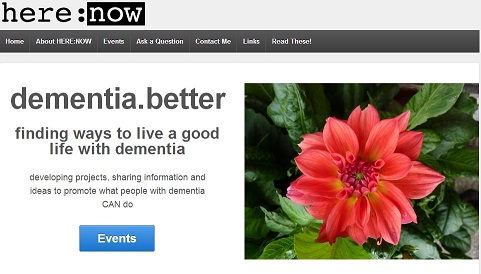Former nurse starts social enterprise to enable people with dementia to live a good life.
One of the chapters in the forthcoming handbook about teaching and practice of social economy in higher education will address social responsibility and transformation. The following case study is about the work done by Emily Abbott, founder and director of a UK social enterprise called Here:Now Dementia Ltd, a not-for-profit company limited by guarantee. Emily works alongside people who have dementia and public organisations to make modest changes to their buildings in ways that can be transformational for the well-being of those living with dementia.
Emily Abbott started Here:Now in 2013, having worked previously as a freelance. She explains the driving force behind her work:
“I want to change the way dementia is perceived, understood. You know, a couple of decades ago, people still would whisper ‘cancer’ rather than speak the word directly. There was a big stigma, it was very hush-hush. And that’s completely changed. But dementia’s in that position. And I’d love to see a really dramatic change – a more positive understanding of what dementia is”.
She points out that there is a very strong dementia carers’ lobby, but that this is not the same as hearing from the people who have dementia themselves. “Carers don’t have the same needs and thoughts and understanding as people with dementia. No matter how good they are, carers are not the same. And so I want to get people to understand that”.
As she explains, you would never have a cancer conference where most speakers are carers and then a couple of token people with cancer might get to speak. But that’s what happens with dementia at the moment. “There will be a few people with dementia, but it still feels quite tokenistic, and then you’ll have lots of representation from carers”.
Part of the work that she has been contracted to do is to help organisations find ways to hear the voices of people living with dementia. She works with York Minster, which has over 500 volunteers, some of whom will almost certainly have dementia. She is helping them think about actively recruiting people with dementia and supporting – openly saying ‘You are welcome’.
Emily is adamant that the changes needed to make buildings dementia-friendly are often small. She believes that these modest changes can be good for everybody, not just those living with dementia. As the room everybody has a strong interest in, she starts with toilets! She explains, “It’s about making little changes – it’s not difficult or dramatic. There’s no special secret. It’s about access.
“It’s about giving plenty of visual clues so things are easy to understand. Also, lighting and use of colour are very important. People with dementia often have problems distinguishing colour and that becomes harder as it progresses. Depth perception is also a big problem for lots of people with dementia. So if you have two completely different floor coverings that meet, that is often interpreted as a barrier, or a step perhaps. And that can lead to falls, or sometimes people just won’t walk further. And things need to look, you know… a tap needs to look like a tap. Or a toilet – if the flush is really obscure or hidden, that becomes very difficult. And it’s not just about being able to see it – it’s about it being very clearly a toilet seat. So if you have a white-walled toilet and you’ve got a white basin, and you can’t afford to completely redecorate it, you could paint a block of colour behind sink and behind the taps so they stand out more. It’s little things that. It’s not fancy. Also, really the most important thing is that very often, as the illness progresses people have incontinence problems. And so for an awful lot of people, they don’t go out because they’re anxious about being able to find the toilet. So good signage is important. Or, if somebody has a carer with them and they need to go into the toilet together, they need to be able to do that without being made to feel embarrassed about it. So often, lots of couples that I know, talk about… so their plan, places they go, they will go because they know ‘Oh, that café has a toilet where nobody notices if we both go in together’. You know, somehow it feels a bit more discreet”.
Reflecting on her training to become a nurse, Emily commented that “you just never were given that message that you can do something different.” This is currently being addressed in a professional development course for nurses at York University where Emily will be collaborating in teaching and assisting with feedback on students’ project for social innovation in community health. She believes it’s important that student nurses see their training opens up all sorts of possibilities for serving the public.
In terms of aspirations for the future, Emily has one simple one: to have a desk to work from away from her house. “The computer I use is the family computer, the desk that it is on I share with four other people”. She would also like to have a bank of reliable volunteers, trained by her and with the same understanding of helping people with dementia live a good life. She is interested in doing more teaching or training. In the long term she would like to have a base for people with dementia to “come and just be”.
